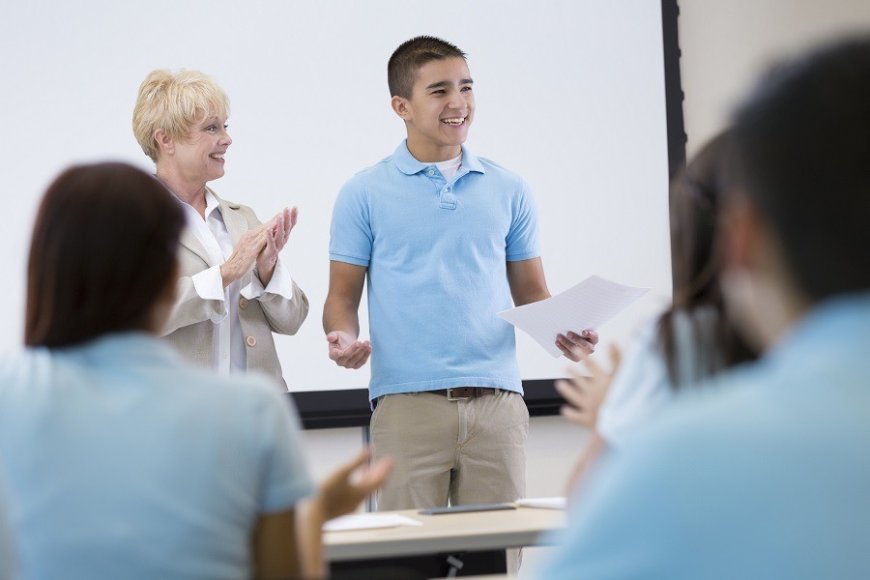How to build interaction with students: 5 effective tips
When students go to a teacher's office during a break, their behavior and mood may change immediately. In some teachers,

When students go to a teacher's office during a break, their behavior and mood may change immediately. In some teachers, students feel comfortable, in the presence of others - even relaxed, and in some - as intense as possible: every lesson, like in war, you just have to go through.
Remember yourself as a child. You probably felt the same way! After all, the general emotional background in the classroom and the working atmosphere is always set by the teacher. He is the main one and the general mood of the class from the first minutes of the lesson depends on his actions or inaction.
How to properly organize the interaction with students so that the lessons were as effective as possible, and communication was mutually enjoyable? Here are some proven ways.
- Hold on with dignity and stick to boundaries
Benevolence, awareness, ability to control their own emotions, respect for students - qualities that are inherent in a successful teacher. Pupils are happy to go to classes with those teachers who know how to tell interesting stories and at the same time create a comfortable emotional background in the classroom. No one likes tyrannical teachers who raise their voices at the first opportunity and those who dictate textbook material every lesson and are indifferent to their work.
From the first lesson, agree with the students on the reciprocal rules that each party must follow. For example, you do your best to prepare a variety of interesting lessons, and students are committed to doing all the homework and following the rules of conduct in the lesson.
Build a dialogue with students based on mutual respect, speak calmly and thoughtfully, treat everyone as an individual.
- Inspire and be inspired
Try to imagine yourself in the place of students and plan each stage of the lesson in such a way that it is effective and interesting for students.
Of course, this approach can take a long time to prepare. However, with the free material you can organize the most interesting lessons with minimal effort.
For example, online tests can be tested using online tests, updating knowledge in the form of a puzzle game will be convenient using web quests, and preparing and quickly testing homework will be easier with the lesson designer. On our platform you can find thousands of ready-made interesting developments, as well as share your experiences.
Be the teacher your students will look forward to, then your communication with students will be joyful and inspiring!
- Be honest
The teacher is not the Internet, so he cannot physically answer all the questions. So, if you suddenly do not know the answer to a question from students, do not be afraid to admit it, but promise to understand before the next lesson. If you have time for a lesson, offer to find the answer together on the Internet.
Some teachers, fearing losing credibility in the eyes of students, prefer to answer quickly the first thing that comes to mind. However, this answer may indeed be incorrect. Or ignore the question by instantly shifting the topic to something else. In such cases, both strategies are wrong.
In the first case, students, by goggling your answer, can instantly detect an error. This will further lead to students losing trust in you and constantly checking your words. Ignoring students' questions is the shortest way to lose credibility in their eyes.
- Ask questions and implement active learning
This activates students' thinking and is a more effective approach compared to the teacher himself "chewing" everything and "laying out on the shelves" in detail in the minds of students.
So when preparing a lesson, try to plan it in such a way that passive listening to the material for students is minimal. If possible, add as many activities as possible - discussion, crossword puzzles, finding answers in the textbook, didactic or educational online games and more.
- Praise
The fact that the teacher notices and celebrates the least successes, gives strength and energy to each student, as well as motivates further success in learning. Sincere and well-deserved praise gives everyone self-confidence, helps them move forward and not be afraid to make mistakes.
You have probably noticed that the more often you sincerely praise students, the more diligent and successful they become! Mandatory condition - praise must be deserved and timely.
A good fair teacher, whose lessons are extremely interesting - the dream of every student. Inquisitive students who look forward to the lesson and motivate the teacher to prepare a variety of creative lessons - the dream of every teacher.
Try to become the favorite teacher for schoolchildren and you will soon see that the students you dreamed of come to you for lessons!
